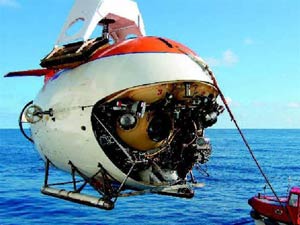For the first time in the world Russia explored the Arctic seabed
The Arctic seabed including the Arctic continental shelf is calculated to have a reserve of about 10 billion tons of oil. For the first time in the world, Russia will conduct exploration of the Arctic seabed in the first 10 days of August 2007.
Although three countries have so far claimed sovereignty over the Arctic: Russia, the United States and Norway, but the Arctic Sea in the Arctic is about 4,700 meters so far no country has explored the seabed. So no country has claimed and been recognized by the United Nations for this continental shelf and deep seabed.
According to the instructions of the Vice President of the Russian National Duma Institute and Artur Chilingarov scientist, on July 30, the scientific research ship Akademik Fyodorov cooperated with the two Mir-1 and Mir-2 deep-sea submarines. conduct a diving test in a sea of Russian Franz Josef Land islands near the North Pole.
The experiment was a successful result that Russian scientists decided to officially dive into the Arctic seabed within the next 10 days if weather permits.

Russia's Mir - 1 deep-sea mini-boat will explore the Arctic seabed.(Photo: Tien Phong)
Under the plan, Russian scientists will set the submarine to the bottom of the Arctic Sea to place a sealed, titanium vessel containing a Russian Federation flag. This is a symbolic object for Russia to declare the Arctic continental shelf and the Arctic seabed about 740,000 square kilometers under the new territorial sovereignty of the Russian Federation.
If Russia's work succeeds, it will start a diplomatic war in the extremely cold Arctic Sea, the last energy border of the Earth. Experts say this effort by Russian scientists lies in a long-term Moscow energy strategy.
Mr. Arkady Soshnikov, Chief Engineer of the Arctic Marine Research Institute based in St. Petersburg Petersburg said that this year an unusually thick ice in the Arctic made it more difficult for scientists to explore and explore.
However, the icebreaker Rossiya, powered by atomic energy, will pave the way for the Akademik Fyodorov and Mir-1 and Mir-2 deep-sea submarines to conduct exploration and exploration of the Arctic seabed.
There are about 100 Russian scientists participating in this expedition. They were tasked with finding evidence to identify a mountain range beneath the Arctic Sea called Lomonosov Ridge running across the Arctic and then connecting the Russian continent to Greenland, the longest geographic part of the Russian Federation.
If this is determined, according to the United Nations Convention on the Law of the Sea, Russia has the right to claim sovereignty over the Arctic continental shelf. The commander of the Arctic Sea exploration project is Russia's famous Arctic and Antarctic explorer Artur Chilingarov, 68 years old. He was named the Hero of the Soviet Union in 1985 by successfully organizing the expedition of Antarctica. During that expedition, his explorer ship was stuck in the thick ice for a long time to be rescued.
Kremlin spokesman Dmitry Peskov said that Russian President Vladimir Putin considered the survey of the Arctic sea bottom very important because it is a unique scientific poll in the world so far.
Moscow has claimed sovereignty over the Arctic region since its Bolsheviks. Recently, the Russian Federation published scientific data to support Russia's sovereignty issue and submitted an application to the UN Commission for the Law of the Sea. The committee rejected Russia's application in 2002, saying there was not enough evidence.
If the Arctic seabed was successful, Russia would reiterate the Arctic continental shelf sovereignty issue in 2009 with new evidence to support Moscow's view.
After Russia gave its views on the continuity of the Lomonosov Ridge under the Arctic Sea, Danish scientists also sought to prove that Lomonosov Ridge is the continuity of the Danish continental shelf and not of Russia.
The Danish Ministry of Science, Technology and Innovation said the scientists are working with Canadian scientists to map the Arctic Sea.
In addition to the potential of oil, gas, the Arctic also has a sense of security. The US Navy has also conducted a number of surveys on the Arctic while Canada said it is currently building eight Arctic sea patrol boats totaling $ 7 billion.
Nguyen Dai Phuong
- Canada started drawing seabed maps around the North Pole
- The world's deepest seabed was first explored
- New details about the Arctic seabed expedition
- The Arctic was warm
- Russia relocated urgently the Arctic research station
- Giant Arctic mosquitoes attack World Cup tournament spots in Russia
- Discover giant monsters at the bottom of the North Pole
- Russia closed the giant submarine with wings twice as large as a jet
- Russia established a nature reserve in the Arctic Sea
- Arctic trailer
- Arctic waves
- The arctic has been 'hot'!
 Surprised: Fish that live in the dark ocean still see colors
Surprised: Fish that live in the dark ocean still see colors Japan suddenly caught the creature that caused the earthquake in the legend
Japan suddenly caught the creature that caused the earthquake in the legend A series of gray whale carcasses washed ashore on California's coast
A series of gray whale carcasses washed ashore on California's coast Compare the size of shark species in the world
Compare the size of shark species in the world